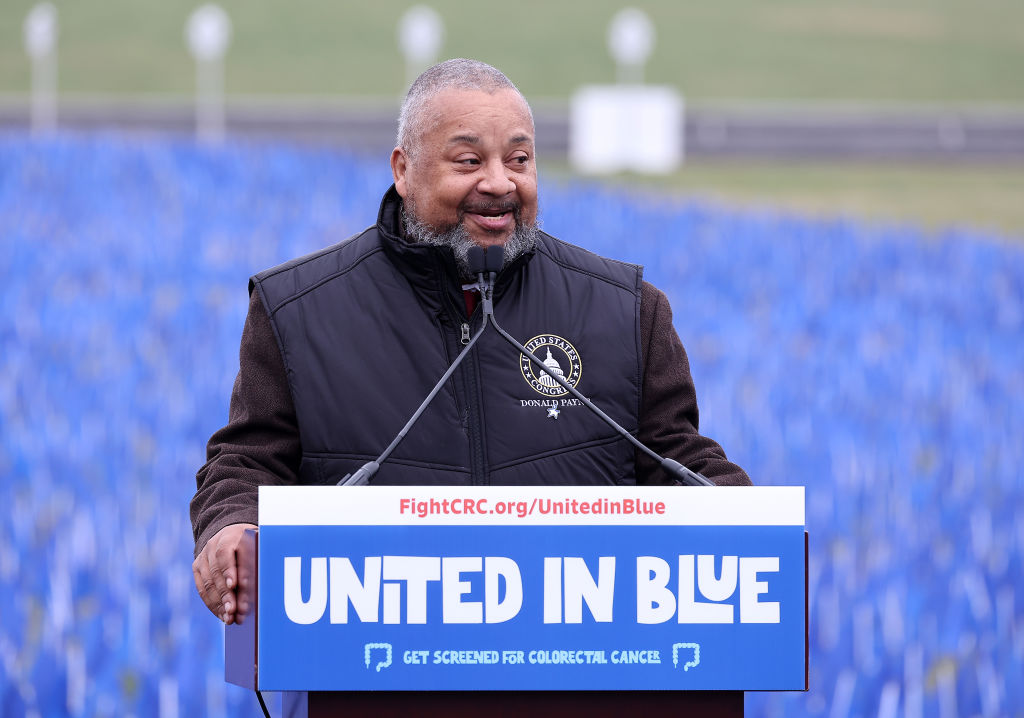Republican Donald Trump asserted Monday there are thousands of people living in the United States "sick with hate" and capable of carrying out the sort of massacre that killed at least 49 people in a Florida nightclub.
The presumptive Republican presidential nominee gave a long speech Monday previewing the foreign policy he would enact as president, including ending immigration from areas in the world from which people have attacked the U.S. and its allies, and insisting Hillary Clinton and President Barack Obama have been weak on immigration.
"I refuse to be politically correct. I want to do the right thing, I want to straighten things out, and I want to make America great again," Trump said in a speech at St. Anselm College in Manchester, New Hampshire that doubled down on his proposed ban on Muslims entering the country. "The days of deadly ignorance will end, and they will end soon, if I'm elected."
Trump was active in the media Monday. His speech came after giving a host of broadcast interviews to preview his remarks; he also said in a Facebook post that he was revoking The Washington Post's press credentials after disputing one of the newspaper's headlines.
The billionaire real estate mogul told Fox News Channel's "Fox & Friends "The problem is we have thousands of people right now in our country. You have people that were born in this country" who are susceptible to becoming "radicalized." He claimed that there are Muslims living here who "know who they are" and said it was time to "turn them in."
The gunman, identified by police as Omar Mateen, a 29-year-old U.S. citizen from Fort Pierce, Florida, opened fire with an assault-style rifle inside a crowded gay nightclub in Orlando early Sunday, killing at least 49 people before dying in a gunfight with police. Another 53 people were hospitalized, most in critical condition.
Trump's longstanding proposal to temporarily ban foreign-born Muslims from entering the United States has triggered outrage from Democrats and Republicans alike, who see it unconstitutional, un-American and counterproductive. But it has helped him win over many primary voters who fear the rise of Islamic extremism and believe that "political correctness" — the fear of offending Muslims — is damaging national security.
U.S. & World
"I want every American to succeed, including Muslims, but they have to work with us," he said in his speech. "They knew that [the Orlando nightclub shooter] was bad. They knew that the people in San Bernardino were bad. But they didn't turn them in, and we had death and destruction."
He also turned his ire on Clinton, the presumptive Democratic nominee, who also delievered a speech about the nightclub shooting on Sunday. In Trump's eyes, Clinton "has no clue" about radical Islam and "won't speak honestly about it, but wants to take Americans' guns way.
He also linked Clinton to Obama's immigration policy, saying both had failed Americans.
"Ask yourself who really is the friend of women and the LGBT community? Donald Trump with actions or Hillary Clinton with words," he said.
Trump earlier said in a phone-interview with NBC's "Today" show that he would not support a ban on the sale of assault-style rifles in the wake of the weekend massacre in Orlando.
He told the network "there are millions" of such weapons already in circulation and said he didn't think instituting a ban would help, since "people need protection."
Trump harshly criticized Obama for referring Sunday to a "terror" attack without going further. "He's not calling it what it is," Trump said before his speech. "This is radical Islamic terrorism. He doesn't want to properly describe it. And if you don't want to discuss it and describe it, you're not going to solve the problem."
Trump's speech was originally intended to attack Hillary Clinton. That switch came a day after Trump called for Clinton to drop out of the race for president if she didn't use the words "radical Islam" to describe the Florida nightclub massacre.
Clinton addressed the Orlando massacre and responded to Trump's early morning attacks Monday in a sober national security address in Cleveland, vowing to make stopping "lone wolf" terrorists a top priority if elected president and calling for ramping up the U.S. air campaign targeting the Islamic State in Iraq and Syria.
But she also vigorously reiterated her call for banning assault weapons, like one of the guns the Orlando shooter used.
"I believe weapons of war have no place on our streets," she said.
Clinton also emphasized her position on increased gun control. When pressed by "Today's" Savannah Guthrie Monday morning about why policy makers have been unable to pass gun reform, Clinton said the gun lobby has terrified elected officials into ignoring the necessary response to the many shootings across the country.
"We cannot fall into the trap set by the gun lobby that says, if you cannot stop every shooting and every incident, you should not try to stop any," Clinton said. "That is not how laws work. It's not common sense. We need to get these weapons of war off the streets."
Trump's hardline approach to fighting Islamic terrorism was a hallmark of his primary campaign. Besides proposing a temporary prohibition on foreign Muslims from entering the country, he has advocated using waterboarding and other harsh interrogation methods to try to stave off future attacks.
In the hours after the Orlando shooting, Trump issued a statement calling on President Barack Obama to resign for refusing "to even say the words 'radical Islam'" in his response to the attack. He said Clinton should exit the presidential race if she does the same.
In an address from the White House, Obama called the tragedy an act of terror and hate. He did not talk about religious extremists. He said the FBI would investigate the shootings in the gay nightclub as terrorism, but added the gunman's motivations were unclear.
While some Republican leaders have encouraged Trump to abandon his proposed Muslim ban in an effort to broaden his support among voters before November's general election, the Orlando attack appeared Sunday to harden the billionaire businessman's position.
Several hours after the speech, Trump's presidential campaign revoked credentials provided to "the phony and dishonest" Washington Post, Trump wrote on his Facebook page, "based on the incredibly inaccurate coverage and reporting of the record setting Trump campaign."
He wrote that he's "no fan of" President Barack Obama, but faulted the Post for a headline posted Monday that he said read, "Donald Trump suggests President Obama was involved with Orlando shooting."
The headline on the story Monday afternoon read, "Donald Trump seems to connect President Obama to Orlando shooting." Trump said in an interview on Fox News Channel Monday morning that when it comes to fighting terrorism, the president "doesn't get it or, or he gets it better than anybody understands."
Post spokeswoman Kristine Coratti Kelly said in an email the headline was changed shortly after the story posted "to more properly reflect what Trump said." She added, "We did so on our own; the Trump campaign never contacted us about it."
A Post photographer and reporter attended Trump's speech in New Hampshire Monday afternoon without issue.
In a statement, Post editor Martin Baron said Trump's decision to revoke the paper's press credentials "is nothing less than a repudiation of the role of a free and independent press."
Trump's campaign has revoked credentials from reporters at other news outlets including The Daily Beast, Politico and the Des Moines Register.
NBC's Asher Klein contributed to this report.



